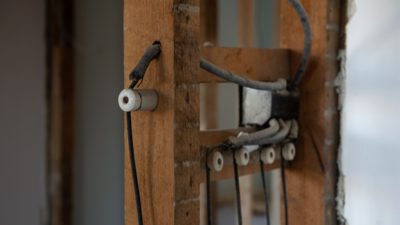If you turn off the water while you’re brushing your teeth, that’s a really great start to a water-conscious lifestyle, but what else can you do to save this precious resource that we rely on every day? According to the U.S. Environmental Protection Agency (EPA), the average family of four in the U.S. uses approximately 400 gallons of water every single day and there are many estimations regarding how much of that is wasted water down the drain.
Besides saving money and energy, saving water is an issue that touches the whole world. Water scarcity is a scary problem worldwide with many organizations, nonprofits, and on-the-ground volunteers working to combat the problem. According to the United Nations, currently about 700 million people suffer from water scarcity and by 2025, 1.8 billion people will be living with absolute water scarcity.
From outdoor landscaping to daily habits and smart purchases, there are many ways to start protecting this precious resource that many of us are lucky enough to have access to every day.
Shower the Efficient Way
Did you know that a typical shower head uses 2.5 gallons of water every minute it’s running? A standard energy-saving shower head uses 1.5 gallons per minute or less which adds up to big savings over the course of a year. With advancements in technology and energy efficiency products, you can still get the water pressure you love without your whole family wasting water! Get no-cost energy-saving shower heads by scheduling a no-cost, no-obligation Home Energy Assessment here so you don’t even need to make a trip to the store.
Use the Dishwasher
Washing dishes by hand won’t save you water. According to the Natural Resources Defense Council (NRDC), “you use up to 27 gallons of water per load by hand versus as little as 3 gallons with an ENERGY STAR-rated dishwasher.” Just scrape the food off your plates and refrain from pre-washing or rinsing before they go in. And always wash full loads! If you don’t have a dishwasher, fill a small bowl with soapy water and wash your dishes by hand without running the water for every dish.
Invest in High Efficiency Appliances
And old dishwasher or washing machine not only wastes energy but it also wastes water. If you are a resident of Massachusetts, the sponsors of the Mass Save® program offer generous rebates for appliance upgrades. When you sign up for a no-cost virtual Home Energy Assessment, you can get access to 0% financing (up to $25K for 7 years) and up to $2,750 in HVAC rebates to help you upgrade your heating and cooling equipment and you’ll find there’s a rebate for just about anything!
Repurpose Your Water
Don’t let that water go down the drain if you don’t have to! Catch the water from your colander after you wash your fruit and use it to water your plants. When you’re waiting for the water to be warm enough for your kid’s bath or to wash your face, don’t let it go down the drain, and instead, keep it and find a way to use it another time of the day. Go a step further and capture rainwater from gutters, downspouts, and the sky! Anytime you keep water from being wasted is a great opportunity to make an impact on your water usage!
Install Faucet Aerators
A faucet aerator is a quick-and-easy fix to save a lot of water on a daily basis. By putting small bubbles into to the running water, it can limit water flow to 1.8-2.2 gallons per minute. This lets you run the faucet longer while using less water to wash your face or hands (and it feels the same!). It can lower a fixture’s water use by approximately 4% and could help you save more than 500 gallons of water per year. Sign up for a Mass Save Home Energy Assessment and get no-cost faucet aerators for your home, plus other energy-saving devices!
Choose Your Plants Carefully
According to the NRDC, 1/3 of residential water goes toward watering your grass or other landscaping. If you plant flowers, grasses, and bushes that are native to your community’s natural climate and have adapted to typical rainfall patterns, they will require little to no water, which saves you water and money. Landscaping in general is a smart way to save energy. For Massachusetts residents living in the “cool region” of the country, the U.S. Department of Energy (DOE) suggests to “use dense windbreaks to protect the home from cold winter winds, allow the winter sun to reach south-facing windows, and shade south and west windows and walls from the direct summer sun.” Just something to think about before you start planting trees!
Take Care of Your Home
If you have a leaky faucet, it’s a bigger deal than you might think. According to Forbes, a slow drip from a leaking faucet can waste as much as 20 gallons of water per day and if you let your toilet leak, it can waste 200 gallons every day! Get a no-cost Home Energy Assessment and you’ll get a custom home energy report so you can learn about how your home consumes and loses energy and how you can start saving. You can also get access to 100% off air sealing and 75%+ off approved insulation if your home isn’t up to standards!
Saving water not only saves energy and money, but it’s a good daily habit to protect a resource that others aren’t as lucky to have. Pass your newfound tips and tricks to your family and make sure that the next generation grows up appreciating the water they have! If you want to learn or do more about water scarcity worldwide, here are some resources:
· More United Nations
· WaterAid
At HomeWorks Energy, protecting our planet and saving energy is at the heart of what we do. Want more tips on saving energy and money and making your home as energy efficient as possible? Call us at (781) 305-3319 or sign up here for a no-cost, no-obligation Home Energy Assessment and we’ll help you access rebates and make smart and easy changes!








